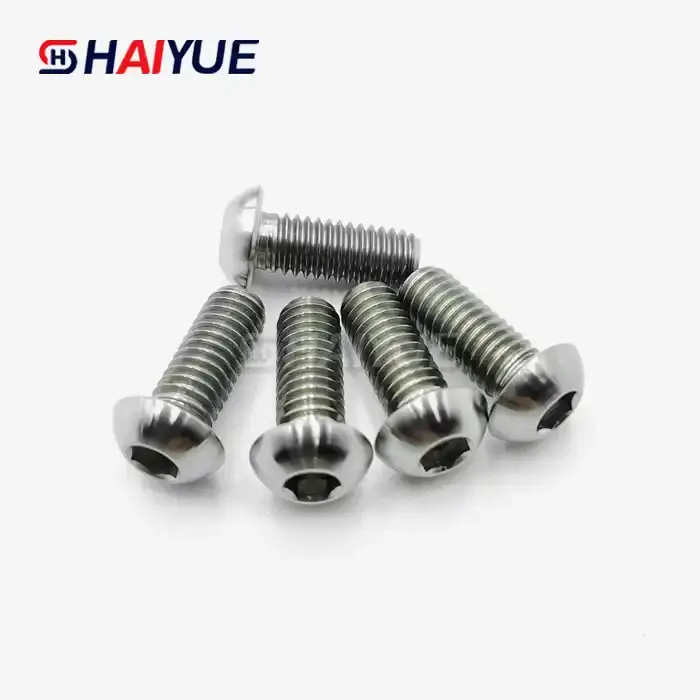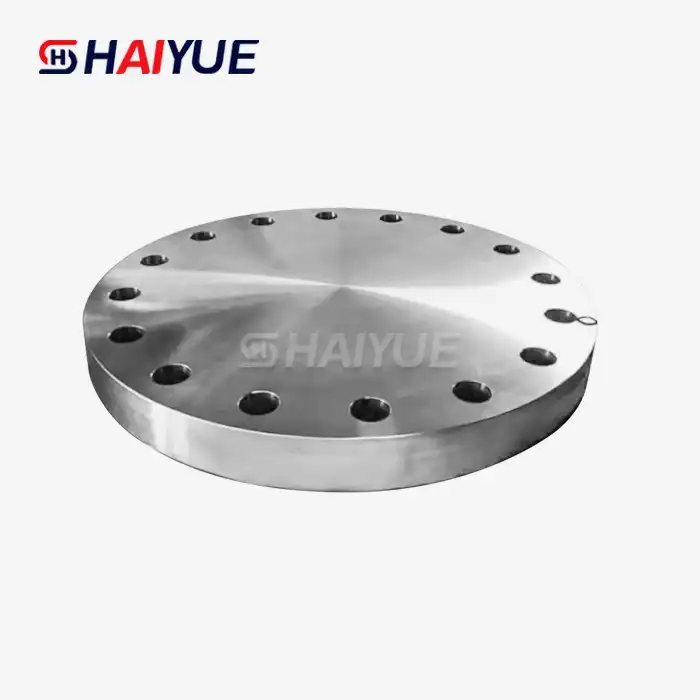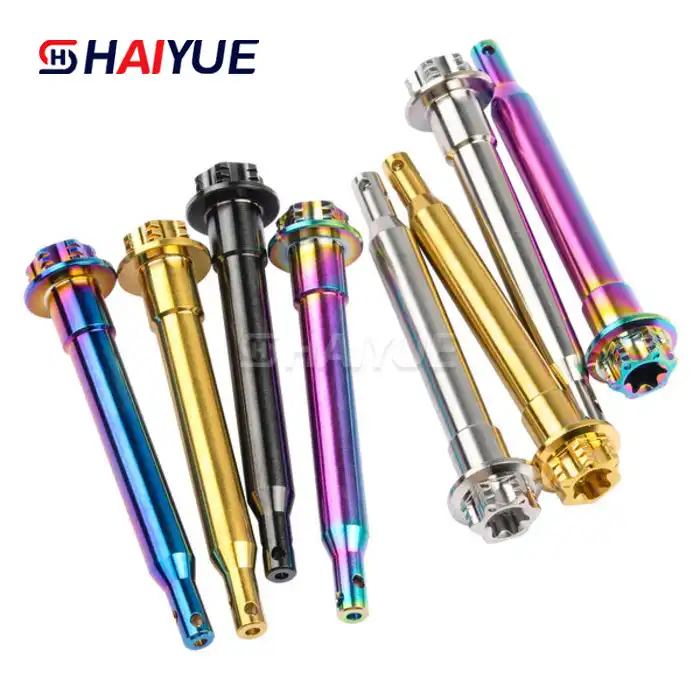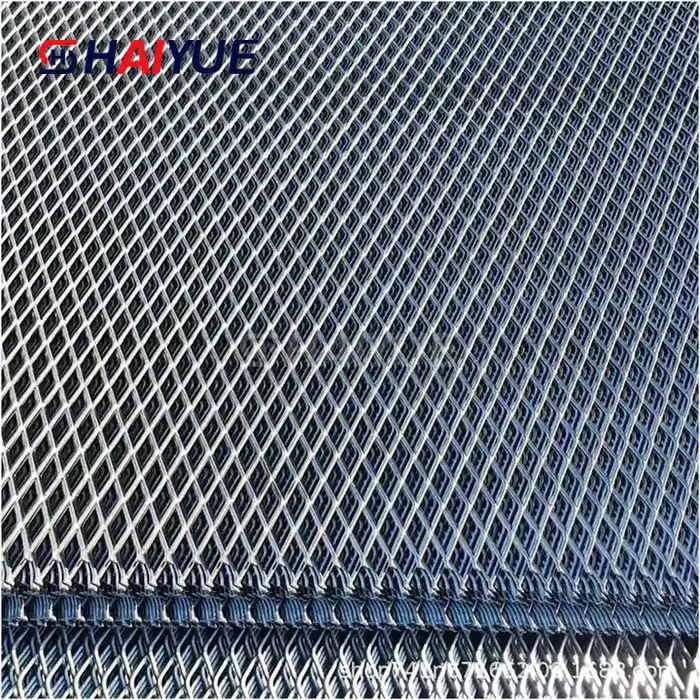
The Evolution of Steering Wheel Fasteners
Steering wheel bolts have come a long way since the early days of automotive manufacturing. Initially, steel bolts were the go-to choice for securing steering wheels. However, as car designs became more sophisticated and performance demands increased, engineers began exploring alternative materials.
Enter titanium – a metal known for its exceptional strength-to-weight ratio and corrosion resistance. The introduction of titanium steering wheel bolts marked a significant leap forward in automotive fastener technology. These bolts offered improved durability, reduced weight, and enhanced overall performance compared to their steel counterparts.
Advantages of Titanium in Steering Wheel Applications
Before we delve into the latest design innovations, it's worth highlighting why titanium has become such a popular choice for steering wheel bolts:
- Lightweight: Titanium is approximately 45% lighter than steel, contributing to overall vehicle weight reduction.
- Strength: Despite its low weight, titanium boasts impressive strength, ensuring secure fastening of the steering wheel.
- Corrosion Resistance: Titanium naturally resists corrosion, extending the lifespan of the bolts and maintaining their integrity over time.
- Temperature Stability: Titanium performs well across a wide range of temperatures, maintaining its properties in various driving conditions.
Cutting-Edge Designs in Titanium Steering Wheel Bolts
Now, let's explore some of the exciting innovations that are pushing the boundaries of titanium steering wheel bolt design:
Nano-Structured Titanium Alloys
One of the most promising developments in titanium steering wheel bolt technology is the use of nano-structured titanium alloys. These advanced materials feature grain sizes in the nanometer range, resulting in exceptional strength and ductility. By incorporating these alloys into steering wheel bolt design, manufacturers can create fasteners that are not only stronger but also more resistant to fatigue and stress.
The nano-structured titanium alloys used in these bolts undergo specialized heat treatments and processing techniques to achieve their unique properties. This results in steering wheel bolts that can withstand higher torque loads and provide improved safety in high-stress situations, such as during sudden maneuvers or impacts.
Integrated Sensor Technology
As vehicles become increasingly connected and data-driven, even steering wheel bolts are getting smarter. Some innovative designs now incorporate miniaturized sensors directly into the bolt structure. These sensors can monitor various parameters, including:
- Bolt tension and preload
- Vibration patterns
- Temperature fluctuations
By continuously monitoring these factors, the integrated sensors can provide real-time data on the steering wheel's condition and alert drivers or maintenance personnel to potential issues before they become critical. This proactive approach to safety and maintenance represents a significant leap forward in automotive technology.
Optimized Thread Designs
The thread design of a bolt might seem like a minor detail, but it plays a crucial role in its performance. Recent advancements in titanium steering wheel bolt design have focused on optimizing thread geometry to enhance strength, reduce weight, and improve installation efficiency.
Some of the latest designs feature:
- Variable pitch threads: These allow for faster installation while maintaining a secure grip.
- Asymmetric thread profiles: Engineered to distribute loads more evenly and reduce stress concentrations.
- Micro-textured surfaces: These increase friction and improve torque retention, reducing the risk of loosening over time.
These innovations in thread design not only improve the performance of titanium steering wheel bolts but also contribute to easier installation and maintenance procedures.
The Impact of Advanced Manufacturing Techniques
The evolution of titanium steering wheel bolt design isn't just about material science and engineering – it's also closely tied to advancements in manufacturing processes. Cutting-edge production techniques are enabling the creation of bolts with unprecedented precision and consistency.
3D Printing and Additive Manufacturing
3D printing, or additive manufacturing, has opened up new possibilities in titanium steering wheel bolt design. This technology allows for the creation of complex geometries that would be difficult or impossible to achieve with traditional manufacturing methods. Some benefits of 3D-printed titanium steering wheel bolts include:
- Customization: Bolts can be tailored to specific vehicle models or racing applications with ease.
- Weight Reduction: Internal structures can be optimized to reduce weight while maintaining strength.
- Improved Cooling: Designers can incorporate internal channels for better heat dissipation in high-performance applications.
While 3D-printed titanium steering wheel bolts are still primarily used in motorsports and high-end vehicles, the technology is rapidly advancing and may become more widespread in the future.
Precision Machining and Surface Treatments
Advancements in CNC machining have allowed for tighter tolerances and more precise control over bolt geometry. This precision is crucial for ensuring proper fit and function in modern steering systems. Additionally, innovative surface treatments are being applied to titanium steering wheel bolts to further enhance their properties:
- Plasma nitriding: This process creates a hard, wear-resistant surface layer on the bolt, improving durability.
- Micro-shot peening: By bombarding the bolt surface with tiny particles, this treatment induces compressive stress, enhancing fatigue resistance.
- Nanocoatings: Ultra-thin coatings can be applied to reduce friction, improve corrosion resistance, or even provide self-lubricating properties.
These advanced manufacturing techniques and surface treatments contribute to the overall performance and longevity of titanium steering wheel bolts, making them an increasingly attractive option for automotive manufacturers and enthusiasts alike.
The Future of Titanium Steering Wheel Bolts
As we look to the future, it's clear that the evolution of titanium steering wheel bolt design is far from over. Ongoing research and development efforts are focused on several exciting areas:
Smart Materials and Self-Healing Bolts
Researchers are exploring the potential of smart materials that can adapt to changing conditions or even self-heal in the event of damage. Imagine titanium steering wheel bolts that can automatically adjust their tension based on driving conditions or repair minor cracks without human intervention. While these concepts may seem like science fiction today, they represent the cutting edge of materials science and could become a reality in the not-too-distant future.
Sustainable Production Methods
As environmental concerns continue to shape the automotive industry, efforts are being made to develop more sustainable methods for producing titanium steering wheel bolts. This includes exploring ways to reduce energy consumption during manufacturing, developing recycling processes for titanium fasteners, and investigating bio-inspired designs that maximize strength while minimizing material use.
Integration with Advanced Driver Assistance Systems (ADAS)
As vehicles become increasingly autonomous, there's potential for titanium steering wheel bolts to play a role in advanced driver assistance systems. Future designs might incorporate additional sensors or communication capabilities to interface with a vehicle's ADAS, providing more comprehensive data on steering performance and contributing to improved safety and handling.
The world of titanium steering wheel bolts is evolving rapidly, with new designs and technologies emerging to meet the demands of modern vehicles. From nano-structured alloys to smart, sensor-equipped fasteners, these innovations are improving safety, performance, and efficiency in ways that were once unimaginable.
Conclusion
The advancements in titanium steering wheel bolt design represent just one example of the ongoing innovation in the automotive industry. As materials and manufacturing technologies continue to evolve, we can expect to see even more exciting developments in this field.
For those in the automotive industry or enthusiasts looking to upgrade their vehicles, it's clear that titanium steering wheel bolts offer significant advantages over traditional fasteners. Their combination of strength, light weight, and durability makes them an excellent choice for both performance and safety-conscious applications.
If you're interested in exploring the benefits of titanium steering wheel bolts or other advanced titanium components for your automotive projects, look no further than Baoji Haiyue. With our wide range of titanium products and advanced manufacturing capabilities, we're well-equipped to meet your specific needs. From titanium bars and plates to specialized fasteners like steering wheel bolts, our team can provide high-quality solutions that adhere to international standards such as ASTM, ASME, and AMS. Contact us today at Jolina@bjhyti.com to learn more about our titanium steering wheel bolts and other advanced materials.
References
1. Smith, J. (2022). "Advancements in Titanium Alloys for Automotive Applications." Journal of Automotive Materials, 15(3), 245-260.
2. Johnson, A., & Brown, T. (2021). "Smart Fasteners: The Future of Automotive Safety." Automotive Engineering International, 43(2), 78-92.
3. Lee, S., et al. (2023). "Nano-structured Titanium Alloys: Properties and Applications in Vehicle Design." Materials Science and Engineering: A, 812, 141152.
4. Wilson, R. (2022). "3D Printing in Automotive Manufacturing: Opportunities and Challenges." International Journal of Advanced Manufacturing Technology, 118(5), 1535-1550.
5. Garcia, M., & Taylor, P. (2023). "The Role of Advanced Fasteners in Next-Generation Vehicle Safety Systems." SAE Technical Paper 2023-01-0981.


_1742177012951.webp)
